
Door een staking bij bpost kan je online bestelling op dit moment iets langer onderweg zijn dan voorzien. Dringend iets nodig? Onze winkels ontvangen jou met open armen!
- Afhalen na 1 uur in een winkel met voorraad
- Gratis thuislevering in België vanaf € 30
- Ruim aanbod met 7 miljoen producten
Door een staking bij bpost kan je online bestelling op dit moment iets langer onderweg zijn dan voorzien. Dringend iets nodig? Onze winkels ontvangen jou met open armen!
- Afhalen na 1 uur in een winkel met voorraad
- Gratis thuislevering in België vanaf € 30
- Ruim aanbod met 7 miljoen producten
Zoeken
Omschrijving
Book Three of The False Wisdom of Philosophers is a philosophical treatise written by Lactantius, a Christian author and theologian, in the early 4th century AD. The book is part of a larger work entitled The Divine Institutes, which aims to refute the teachings of pagan philosophers and promote Christian doctrine.In this particular book, Lactantius focuses on the shortcomings of the philosophical schools of Epicureanism, Stoicism, and Aristotelianism. He argues that these schools are flawed in their understanding of the nature of God, the soul, and the afterlife, and that they promote immoral behavior and beliefs.Lactantius provides a detailed critique of each school's teachings, drawing upon Christian scripture and theology to support his arguments. He also offers his own interpretation of these concepts, emphasizing the importance of faith, virtue, and divine grace in achieving salvation.Overall, Book Three of The False Wisdom of Philosophers offers a comprehensive analysis of the philosophical ideas that were prevalent in Lactantius' time and demonstrates the superiority of Christian doctrine. It is a valuable resource for scholars of early Christian theology and philosophy.Does wisdom therefore nowhere exist? Yes, indeed, it was amongst them, but no one saw it. Some thought that all things could be known: these were manifestly not wise. Others thought that nothing could be known; nor indeed were these wise: the former, because they attributed too much to man; the latter, because they attributed too little. A limit was wanting to each on either side. Where, then, is wisdom? It consists in thinking neither that you know all things, which is the property of God; nor that you are ignorant of all things, which is the part of a beast.This scarce antiquarian book is a facsimile reprint of the old original and may contain some imperfections such as library marks and notations. Because we believe this work is culturally important, we have made it available as part of our commitment for protecting, preserving, and promoting the world's literature in affordable, high quality, modern editions, that are true to their original work.
Specificaties
Betrokkenen
- Auteur(s):
- Uitgeverij:
Inhoud
- Aantal bladzijden:
- 68
- Taal:
- Engels
Eigenschappen
- Productcode (EAN):
- 9781419110504
- Verschijningsdatum:
- 17/06/2004
- Uitvoering:
- Paperback
- Formaat:
- Trade paperback (VS)
- Afmetingen:
- 190 mm x 235 mm
- Gewicht:
- 131 g

Alleen bij Standaard Boekhandel
+ 54 punten op je klantenkaart van Standaard Boekhandel
Beoordelingen
We publiceren alleen reviews die voldoen aan de voorwaarden voor reviews. Bekijk onze voorwaarden voor reviews.











